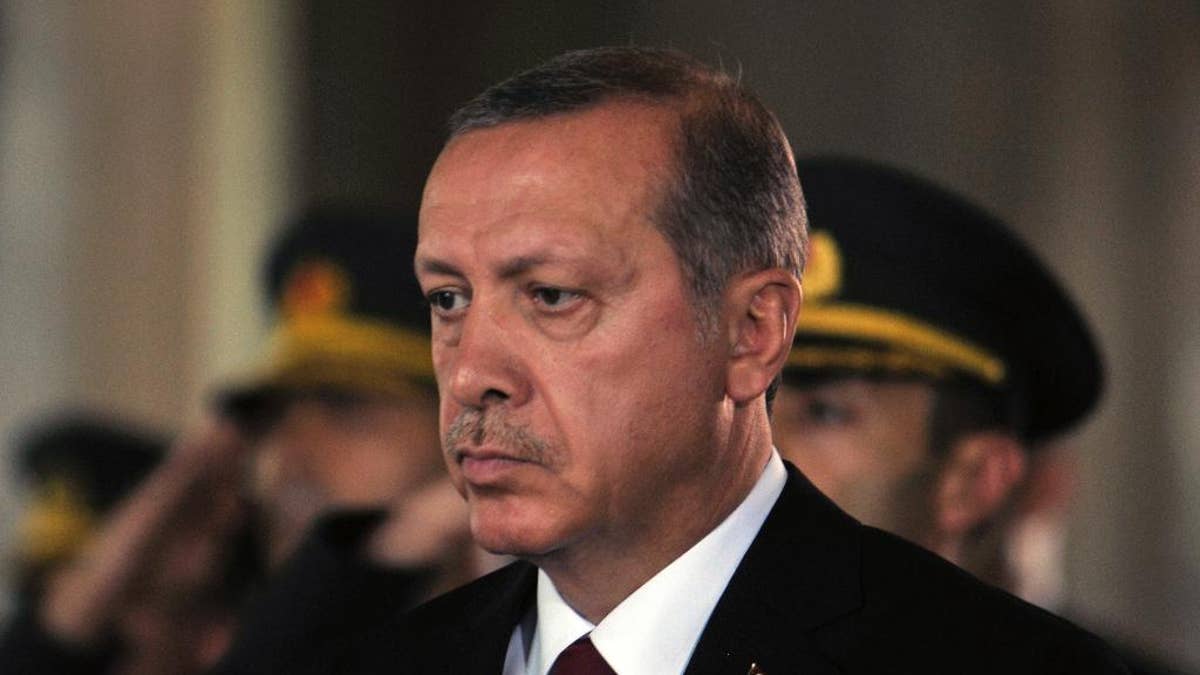
Turkish President Recep Tayyip Erdogan may welcome Muslim Brotherhood leaders, after they were kicked out of Qatar. (AP Photo) (The Associated Press)
They're pariahs in much of the Middle East, but the Muslim Brotherhood may find the welcome mat in Turkey, a NATO ally that nonetheless seems unmoved by regional and western pressure to shun the Islamist organization.
Kicked out of Egypt after a brief period in which it controlled Cairo, the Muslim Brotherhood brass has lately sought refuge in Qatar. But on Sept. 13, under pressure from a number of neighboring Gulf States such as Saudi Arabia, Bahrain, and the United Arab Emirates, Qatar announced it will boot a number of senior Egyptian Muslim Brotherhood. It’s a huge embarrassment for Qatar, which although a close U.S. ally, has long been the key international champion and significant funder of the Muslim Brotherhood cause as well as of the Al Nusra Front and, according to some reports, the Islamic State.
[pullquote]
Their next destination seems clear, and their agenda - the overthrow of secular leaders in Middle Eastern nations - remains the same, say observers.
“Turkey is going to grant asylum to the Muslim Brotherhood leaders,” Benjamin Weinthal, Europe-based research fellow at Washington’s Foundation for Defense of Democracies, told FoxNews.com. “The Muslim Brotherhood has already announced, according to reports, that they plan to use their refugee status in Turkey to destabilize... and try to overthrow Egypt’s [current] government. It’s startling, because you have a NATO member, Turkey, that will probably provide refuge to Muslim Brotherhood leaders who will seek to overthrow Egypt.
Qatar's move to expel the seven Egyptian Muslim Brotherhood figures, including its foreign affairs spokesman Amr Darragh, and secretary-general Mahmoud Hussein, came as Turkish President Recep Tayyip Erdogan was returning from a visit to the oil-rich nation. When he was asked if he had agreed to offer safe haven to the Muslim Brotherhood officials, he didn't say no.
“If they file a request to move to Turkey we will assess their situation and they can move to Turkey if there is no reason to prevent their entry,” Erdogan said.
It remains to be seen whether or not the Qatar-owned Al Jazeera TV network, extremely vocal in its support of the Muslim Brotherhood government in Egypt and which has continued as a mouthpiece for the now Eygptian-designated terror organization, will maintain its pro-Muslim Brotherhood stance now that key figures in the group have been expelled from Doha, and Qatar is becoming increasingly isolated on the issue.
“Qatar and Turkey both gave sanctuary to the Muslim Brotherhood after it was ousted from Egypt, and both currently support the Muslim Brotherhood and Hamas,” Eric Mandel wrote Thursday in the Jerusalem Post. “Hamas's overseas command center is based in Turkey, and the U.S. has been unable to persuade Turkey to stop Islamic State from selling oil on the Turkish black market. Paradoxically, Qatar and Turkey are considered by the American administration as strong allies in the war against Islamic extremism.”
Weinthal charges that Turkey is an unreliable partner for the U.S. and the west in its fight against the Islamic extremism.
“Erdogan has refused to join the current U.S.-driven coalition to eliminate the Islamic State from Iraq and Syria. Turkey is a recruitment center for Islamic State fighters,” Weinthal said. “When I was on the Turkey-Syria border at this time last year I saw how porous the border is, and how Turkey’s lax policy showed no real effort to enforce the border. I witnessed radical Islamists crossing into Syria on a regular basis.”
Making the picture potentially even more disturbing, as yet unverified reports this week from the Turkish daily newspaper Hurriyet suggested that Interpol may have issued a red notice – effectively an international arrest warrant – for the seven Muslim brotherhood members.
If pressure from the U.S. – seeking to curry favor and rebuild ties with Egypt severely damaged by the Obama administration’s backing of the ousted Muslim Brotherhood government of Mohammed Morsi – prompts Turkey to reconsider its harboring of the seven men ejected from Qatar, experts speculate that Libya, Kuwait or Tunisia could be possible destinations. There have also been suggestions that the Muslim Brotherhood leaders could head for Great Britain.
Despite significant British intervention alongside the U.S. in Iraq and Afghanistan since the turn of the century in the fight against international terror, and Prime Minster David Cameron’s recent powerful pledge to clamp down on Islamic extremists closer to home, Britain has long been acknowledged as a haven for various Middle Eastern terror groups. They have eagerly taken advantage of the democratic freedoms offered there.
Already, in light of the flight from Qatar of the seven senior Muslim Brotherhood figures, Egypt’s ambassador to Great Britain, Ashraf El-Kholy, has warned against the Muslim Brotherhood being allowed to expand its activities in London, where it has for some years had a European base of operations.
“The [Muslim Brotherhood] leadership here [in Britain] should be put under review by your side to be sure they have not incited things to be done in Egypt or in the Middle East,” El-Kholy told the London-based Telegraph earlier this week. “London can be a hub. They are planning activities, such as opening a TV station and newspapers here... that are part of their aims against us.”
For now though, Turkey appears set continue to provide a base for the Muslim Brotherhood, and Erdogan is unlikely to easily give up on his backing of the group having for so long nailed his colors to their mast. Paradoxically, the U.S. and NATO have come to rely on Turkey as a bridge to the East, which Weinthal called a mistake.
“Erdogan has incarcerated the most number of journalists in the world. He has passed the internet control law further eroding press freedoms and freedom of expression in Turkey, and he has directly and indirectly supported Islamic State on his border to dislodge Assad’s regime.”







































